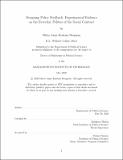Designing policy feedback : experimental evidence on the everyday politics of the social contract
Author(s)
Bergman, Olivia Anna Kristina.
Download1221004083-MIT.pdf (4.945Mb)
Alternative title
Experimental evidence on the everyday politics of the social contract
Other Contributors
Massachusetts Institute of Technology. Department of Political Science.
Advisor
Kathleen Thelen.
Terms of use
Metadata
Show full item recordAbstract
For most of history, people had only infrequent personal contact with their governments. The modern social contract generates everyday interactions between citizens and states. In this dissertation, across three papers and three countries, I examine when and how such policy experiences shape attitudes toward government, using experimental methods grounded in a comparative perspective. I explore traditional policy design factors -- the defining aspects of policies that shape "who gets what", which I term 'macro design' -- alongside factors receiving less attention in the literature -- those that often shape "when and how", which I term 'micro design'. In the first paper, I compare the experience of filing taxes in the US and Sweden, showing that design focuses citizens' attention in very different ways: on tax compliance and payment in the US, on refunds in Sweden. In a nationally-representative survey experiment, I link a US-style tax environment with perceptions that the government is wasteful. In the second paper, I conduct a large-scale randomized field experiment that shifts administrative burdens away from citizens. Using a highly scalable digital intervention that simplifies the claiming of a means-tested benefit, I substantially increase reported satisfaction with both the bank and government among 195,414 low-income customers of an Australian bank. This is true even though effects on take-up, ascertained by linking bank data to government records, are modest. In the third paper, I situate these findings within a new theory of how the design of policy experiences shapes government attitudes. I propose that two dimensions affect attribution of credit for policies: the valence of the experience, and the salience of the government's role. After outlining how macro and micro design factors shape experiences, I present a nationally-representative survey experiment showing that channeling benefits through the tax code results in government not getting credit where due. Together, these experiments illustrate the powerful effects of subtle design factors on citizens' views of government. More broadly, this dissertation suggests that, in addition to how policy content affects politics -- "who gets what" -- studying "when" and especially "how" citizens experience policies in their everyday lives illuminates attitudes underpinning democracy.
Description
Thesis: Ph. D., Massachusetts Institute of Technology, Department of Political Science, May, 2020 Cataloged from student-submitted PDF version of thesis. Includes bibliographical references (pages 167-172).
Date issued
2020Department
Massachusetts Institute of Technology. Department of Political SciencePublisher
Massachusetts Institute of Technology
Keywords
Political Science.